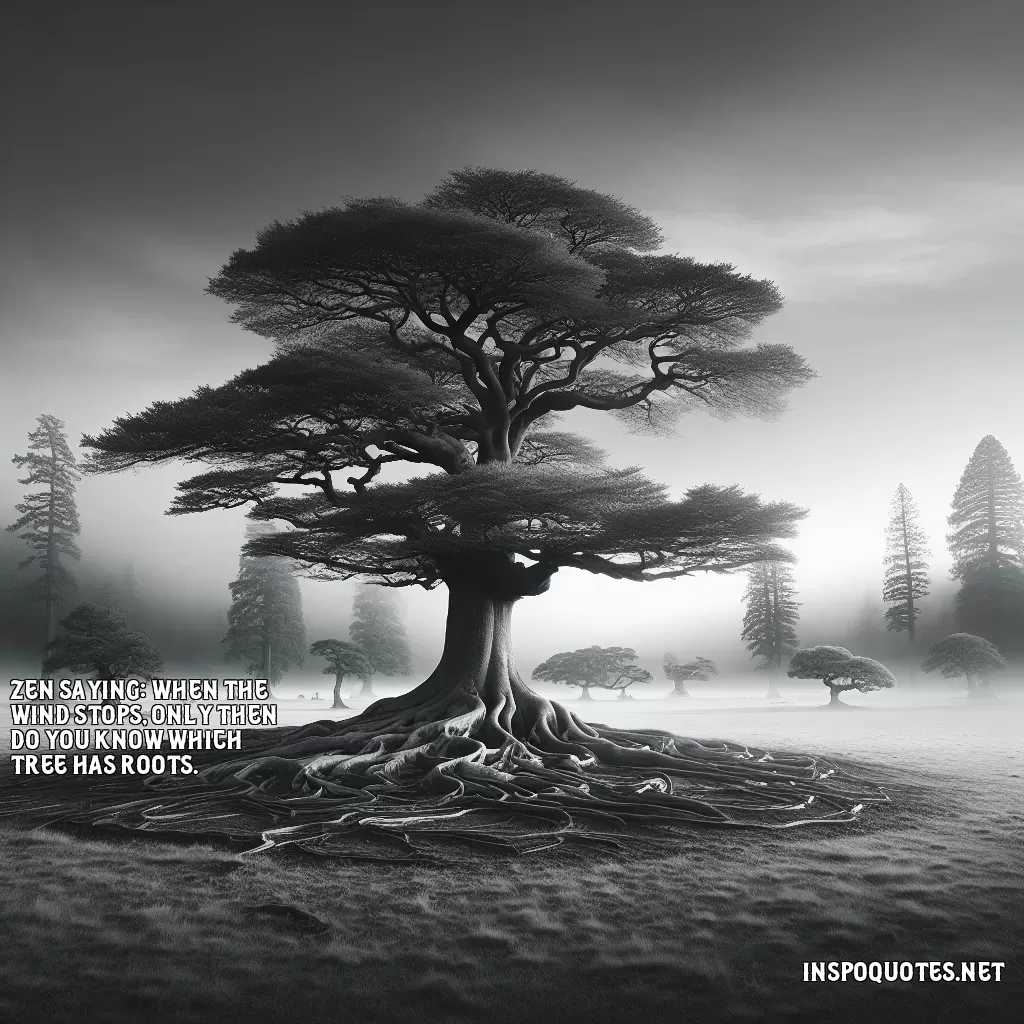
Zen Saying: When the wind stops, only then do you know which tree has roots.
Author: Zen Saying
👁️ 10 views

Zen Saying: When the wind stops, only then do you know which tree has roots.
👁️ 10 views
This Zen saying, "When the wind stops, only then do you know which tree has roots," conveys a profound philosophical insight about adversity, resilience, and true strength. At its core, it suggests that challenges and difficulties serve as the ultimate test of one's inner strength and stability. Metaphorically, the "wind" represents life's trials and turbulence. When the wind is blowing – when we are in the midst of challenging situations – it may be difficult to discern who or what will withstand the pressure. Trees in a storm bend and sway, leaves are scattered, and sometimes branches break. This tumult can obscure which trees are truly strong and deeply rooted. However, "when the wind stops" and calm returns, the real picture emerges. The trees still standing tall after the storm demonstrate their firmness and deep-rootedness. In human terms, this suggests that only after enduring hardships do we reveal our true character and resilience. Those who remain steadfast and unshaken when the trials subside are those who possess inner strength and resolve. Furthermore, this saying invites introspection about the nature of resilience and authenticity. It challenges us to consider whether our foundations are shallow or deeply rooted in strong values, principles, and beliefs. True resilience, like well-anchored roots, cannot be seen or measured during times of ease, but it becomes evident in the aftermath of adversity. Thus, the saying emphasizes cultivating a strong, robust inner life to weather life's storms.
Quote By: Zen Saying
**Zen Saying: An Exploration of Wisdom and Simplicity**
Zen Saying, often regarded as a profound expression of Eastern philosophy, represents the distilled insights of Zen Buddhism. While the exact origins of individual sayings may be obscure, they are deeply rooted in the teachings of enlightened Zen masters and serve to illuminate the nature of human experience, mindfulness, and the path to enlightenment.
Zen sayings often reflect the principles of simplicity, presence, and the importance of direct experience. They are not merely phrases but meditative invitations to contemplation. For example, one popular Zen saying is, "Before enlightenment, chop wood, carry water. After enlightenment, chop wood, carry water." This captures the essence of Zen philosophy — that the mundane aspects of life carry profound meaning and that enlightenment does not remove one from the world but rather deepens one’s engagement with it.
The resonance of Zen sayings transcends cultural boundaries, offering wisdom that is applicable in various contexts. Their simplicity is deceptive; behind the apparent straightforwardness often lies layers of meaning that can provoke deep introspection and awakening. Zen Saying plays a crucial role in this tradition, embodying the practice of clarity, authenticity, and presence.
Many Zen practitioners and scholars have dedicated their lives to exploring and disseminating these teachings. The repeated use of Zen sayings in meditation sessions, dharma talks, and literary works highlights their importance in Zen practice. This oral and written tradition ensures that the insights encapsulated in these sayings continue to inspire generations in their quest for understanding and inner peace.
Zen Saying serves as a reminder that wisdom can be found in the simplest of phrases and that mindfulness and reflection are keys to navigating the complexities of life. Through their eloquence and depth, Zen sayings encourage individuals to engage with the present moment fully, revealing the extraordinary within the ordinary and guiding seekers toward a more profound awareness of their existence. Embracing Zen sayings can transform one’s perspective, turning everyday experiences into pathways of spiritual growth and insight.